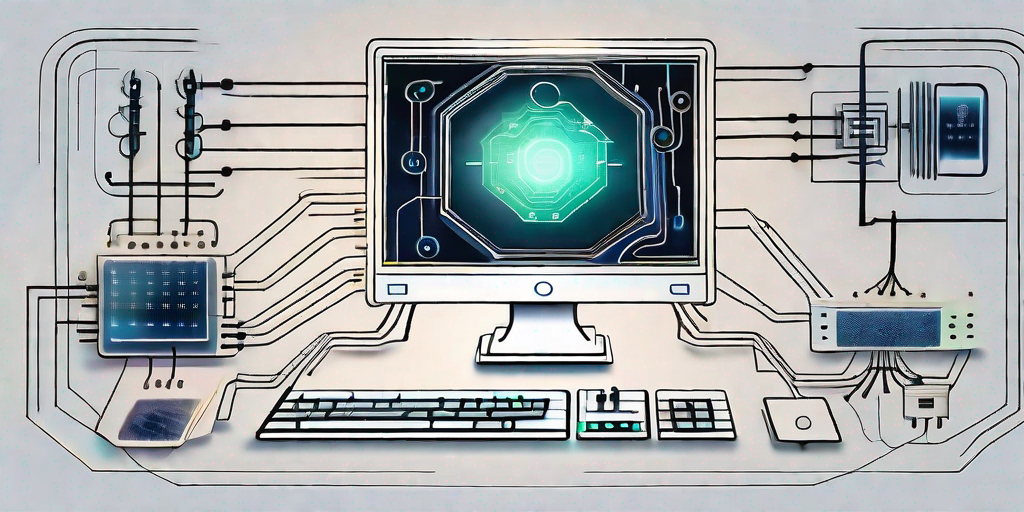Understanding Quantum Computing with an Innovation Keynote Speaker

Understanding Quantum Computing with an Innovation Keynote Speaker
Quantum computing may sound like science fiction, but it is becoming increasingly relevant in today's technological landscape. As we continue to push the boundaries of what is possible, it is important for us to have a clear understanding of this complex field. That's where an innovation keynote speaker comes in. In this article, we will explore the basics of quantum computing, and how an innovation keynote speaker can help simplify these concepts for a wider audience.
Understanding the Basics of Quantum Computing
Before we delve into the role of an innovation keynote speaker, let's first grasp the fundamentals of quantum computing. Traditional computers use bits as the building blocks of information, with each bit representing either a 0 or a 1. In contrast, quantum computers use quantum bits, or qubits, which can represent both 0 and 1 simultaneously, thanks to a phenomenon called superposition.
This ability to exist in multiple states simultaneously forms the foundation of quantum computing's power. It allows quantum computers to perform intricate calculations at a staggering speed, solving complex problems that would take traditional computers an impractically long time.
Quantum computing also relies on another interesting phenomenon: entanglement. Essentially, entanglement allows two qubits to become correlated in such a way that the state of one qubit can instantly affect the state of the other, regardless of the distance separating them.
By harnessing the power of superposition and entanglement, quantum computers are poised to revolutionize various fields, from drug discovery and financial modeling to cryptography and optimization problems.
Let's dive deeper into the concept of superposition. Imagine a qubit as a spinning coin. In classical computing, the coin can only be in one of two states: heads or tails, represented by 0 or 1. However, in quantum computing, the qubit can be in a superposition of both states at the same time. It's as if the coin is spinning so fast that it appears to be both heads and tails simultaneously. This allows quantum computers to explore multiple possibilities simultaneously, exponentially increasing their computational power.
Now, let's explore the fascinating phenomenon of entanglement. Imagine two qubits that are entangled. When one qubit is measured, its state becomes instantly correlated with the state of the other qubit, regardless of the distance between them. This correlation is maintained even if the qubits are separated by vast distances, defying the laws of classical physics. This property of entanglement opens up exciting possibilities for secure communication and teleportation-like phenomena.
Quantum computing's potential impact on various industries is immense. In drug discovery, quantum computers can simulate and analyze complex molecular interactions, significantly speeding up the development of new drugs. Financial modeling can benefit from quantum algorithms that optimize investment portfolios and predict market trends with unparalleled accuracy. Cryptography, a field that relies on secure communication, can be revolutionized by quantum-resistant algorithms that protect sensitive information from quantum attacks. Optimization problems, such as route planning and resource allocation, can be solved more efficiently using quantum algorithms, leading to cost savings and improved efficiency.
As we continue to unlock the mysteries of quantum computing, the possibilities for innovation and advancement are endless. Quantum computers have the potential to solve problems that are currently intractable, paving the way for a new era of scientific discovery and technological breakthroughs.
How an Innovation Keynote Speaker Simplifies Complex Concepts
Now that we have a basic understanding of quantum computing, let's explore the role of an innovation keynote speaker in simplifying these complex concepts. Quantum computing can be intimidating, especially for those without a scientific or technical background. This is where an innovation keynote speaker can bridge the gap between complex theories and real-world applications.
An innovation keynote speaker possesses the unique ability to breakdown complex topics into digestible pieces of information. By using relatable analogies and real-life examples, they can make quantum computing accessible and understandable to a wider audience.
Imagine attending a conference on quantum computing where an innovation keynote speaker takes the stage. As they start their presentation, they begin by comparing quantum bits, or qubits, to traditional bits in a computer. They explain that while traditional bits can represent either a 0 or a 1, qubits can exist in a superposition of both states simultaneously. This analogy helps the audience grasp the fundamental difference between classical and quantum computing.
Furthermore, the innovation keynote speaker brings in real-life examples to illustrate the potential of quantum computing. They describe how quantum computers can solve complex optimization problems much faster than classical computers. They give an example of a logistics company trying to optimize their delivery routes to minimize fuel consumption and time. The speaker explains how a quantum computer could analyze all possible combinations of routes simultaneously, finding the most efficient solution in a fraction of the time it would take a classical computer.
Through engaging storytelling and interactive demonstrations, an innovation keynote speaker can captivate their audience and ignite their curiosity. They might invite a volunteer from the audience to participate in a simple quantum computing experiment. The speaker explains how quantum entanglement allows two qubits to be connected in such a way that the state of one qubit instantly affects the state of the other, regardless of the distance between them. The volunteer witnesses this phenomenon firsthand, experiencing the mind-bending nature of quantum mechanics.
By conveying the excitement and potential of quantum computing, the innovation keynote speaker inspires others to explore this fascinating field. They emphasize that quantum computing is not just for scientists and researchers but has the potential to revolutionize various industries, such as drug discovery, financial modeling, and artificial intelligence.
In conclusion, an innovation keynote speaker plays a crucial role in simplifying complex concepts like quantum computing. Through relatable analogies, real-life examples, engaging storytelling, and interactive demonstrations, they make these concepts accessible and intriguing to a wider audience. Their ability to bridge the gap between theory and application sparks curiosity and inspires others to delve deeper into the world of quantum computing.
The Role of Quantum Computing in Future Technologies
As we look to the future, it is clear that quantum computing will play a significant role in shaping technological advancements. With its immensely powerful computational abilities, quantum computing has the potential to transform industries and solve intractable problems.
In the field of drug discovery, for example, quantum computers can simulate molecular interactions with unprecedented accuracy, leading to the development of more effective drugs in a fraction of the time. By harnessing the principles of quantum mechanics, these computers can model the behavior of atoms and molecules, allowing researchers to understand the intricacies of drug-target interactions at a level of detail previously unattainable. This breakthrough has the potential to revolutionize the pharmaceutical industry, accelerating the discovery and development of life-saving medications.
In finance, quantum computing can optimize investment portfolios and improve risk assessment models. Traditional portfolio optimization techniques rely on classical computing, which can only consider a limited number of variables due to computational constraints. However, quantum computers can process vast amounts of data simultaneously, enabling more comprehensive analysis of investment options. By leveraging quantum algorithms, financial institutions can make more informed decisions, maximizing returns and minimizing risks. Furthermore, quantum computing can enhance risk assessment models by simulating complex market scenarios and identifying potential vulnerabilities in real-time, enabling proactive risk management strategies.
And in the realm of cybersecurity, quantum computers can potentially crack current encryption algorithms, highlighting the urgent need for quantum-resistant cryptography. The security of digital communication relies on the assumption that it would take classical computers an impractical amount of time to decrypt encrypted messages. However, quantum computers have the potential to break these cryptographic algorithms by leveraging their ability to perform certain calculations exponentially faster than classical computers. This poses a significant threat to sensitive information, such as financial transactions, personal data, and government communications. To address this challenge, researchers are actively developing quantum-resistant cryptographic techniques that can withstand attacks from quantum computers, ensuring the confidentiality and integrity of data in the quantum era.
These are just a few examples of how quantum computing can revolutionize different sectors. By understanding the implications and possibilities, businesses and individuals can prepare for the future and stay ahead in an ever-evolving technological landscape. Quantum computing has the potential to unlock new frontiers in scientific research, enable breakthroughs in artificial intelligence, and revolutionize optimization and machine learning algorithms. As the field continues to advance, it is crucial for researchers, policymakers, and industry leaders to collaborate and explore the ethical, legal, and societal implications of this transformative technology.
Insight from an Innovation Keynote Speaker: Quantum Computing and Business Impact
When it comes to the intersection of quantum computing and business, an innovation keynote speaker can provide invaluable insight. They can shed light on how quantum computing will impact various industries and guide organizations in leveraging its potential for competitive advantage.
For businesses, understanding the potential applications and limitations of quantum computing is crucial for strategic decision-making. An innovation keynote speaker can help organizations navigate this complex terrain and identify opportunities to harness the power of quantum computing.
Furthermore, an innovation keynote speaker can demystify the hype surrounding quantum computing and separate fact from fiction. With their expert knowledge and understanding, they can provide a balanced perspective on the current state of quantum computing and its realistic timelines for implementation in different industries.
By staying informed and proactive, businesses can position themselves at the forefront of quantum computing innovation, poised to capitalize on its transformative capabilities.
Practical Applications of Quantum Computing in Everyday Life
Quantum computing has the potential to revolutionize the world as we know it, but how does it affect our everyday lives? Despite being in the early stages of development, quantum computing already shows promise in various practical applications.
One area where quantum computing could have a profound impact is weather forecasting. By simulating complex weather patterns and improving the accuracy of predictions, quantum computers can help us better prepare for severe storms and natural disasters.
In the realm of transportation, quantum computing can optimize traffic flow and logistics, reducing travel times and fuel consumption. Imagine a future where you can navigate congested cities seamlessly, thanks to quantum-powered algorithms.
Quantum computing can also transform fields like materials science and energy production, by enabling researchers to develop next-generation materials and design more efficient solar panels and batteries.
These practical applications highlight the potential for quantum computing to improve our lives in ways we may not even imagine yet. By embracing this technology and exploring its possibilities, we pave the way for a future full of innovation and progress.
Conclusion
In conclusion, quantum computing is a rapidly evolving field with immense potential. By understanding the basics of quantum computing and leveraging the expertise of an innovation keynote speaker, we can demystify this complex field and explore its practical applications.
As quantum computing continues to advance, it is crucial for individuals and businesses to stay informed and prepare for the transformative impact it will have on various industries. By embracing quantum computing and capitalizing on its capabilities, we can unlock a world of possibilities and shape a future driven by innovation.
FAQ
1. What is quantum computing?
Quantum computing is a field of computing that utilizes quantum bits, or qubits, to process and store information. Unlike traditional computers that use bits to represent either a 0 or a 1, qubits can exist in a superposition of both states simultaneously, allowing for exponentially faster and more powerful computations.
2. How does an innovation keynote speaker simplify the concepts of quantum computing?
An innovation keynote speaker simplifies the concepts of quantum computing by using relatable analogies and real-life examples. They break down complex theories into digestible pieces of information, making quantum computing accessible and understandable to a wider audience.
3. What are some practical applications of quantum computing?
Quantum computing has the potential to impact various industries. Some practical applications include drug discovery, where quantum computers can simulate molecular interactions to accelerate the development of new drugs, and finance, where quantum algorithms can optimize investment portfolios and improve risk assessment models. Quantum computing also has implications for cybersecurity, with the need for quantum-resistant cryptography to protect sensitive information.
Contact an Innovation Keynote Speaker for Your Event
If you've been fascinated by the possibilities of quantum computing and how it can revolutionize various industries, consider inviting Dr. Mark van Rijmenam, an accomplished Innovation Keynote Speaker, to your next event. With his expert knowledge and engaging presentation style, Dr. van Rijmenam can demystify complex concepts like quantum computing, making them accessible and intriguing for your audience. He brings a wealth of experience in explaining how such advanced technologies can be harnessed for strategic advantage in business. Don't miss this opportunity to ignite curiosity and inspire innovative thinking among your team or event attendees. Simply complete the form below and we will be in touch within 24 hours to discuss how Dr. van Rijmenam can contribute to the success of your event.
Thanks for your inquiry
We have sent you a copy of your request and we will be in touch within 24 hours on business days.
If you do not receive an email from us by then, please check your spam mailbox and whitelist email addresses from @thedigitalspeaker.com.
In the meantime, feel free to learn more about The Digital Speaker here.
Or read The Digital Speaker's latest articles here.





